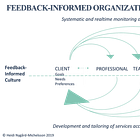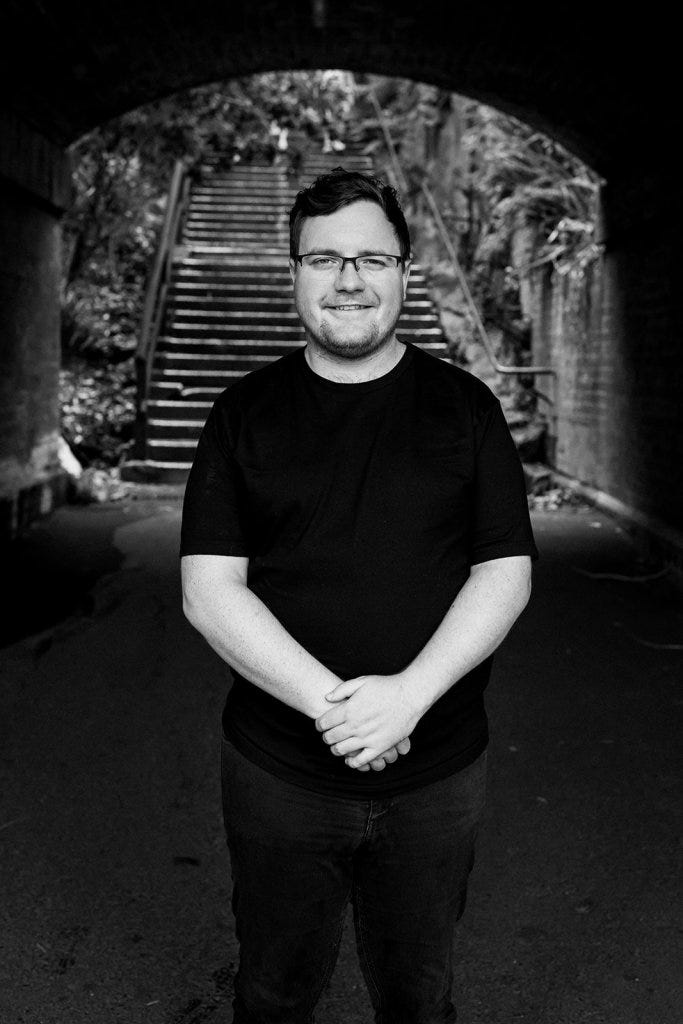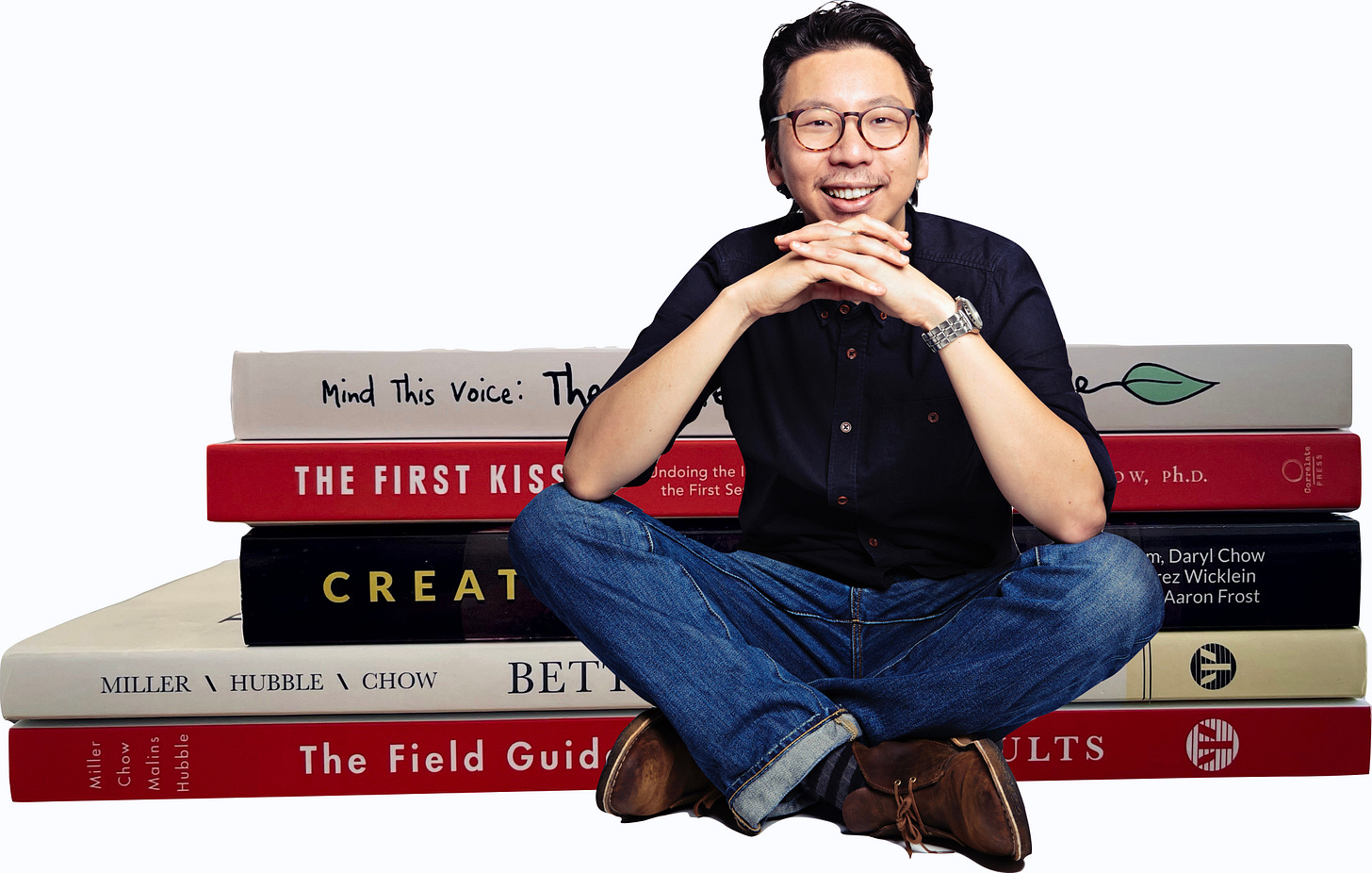"Why I Don't Do a 'Thorough and Structured' Intake." Frontiers Friday #181 ⭕️
A guest contribution by psychologist Jimeoin Muecke, and his take about the price we pay for obsessing about thorough assessments in psychotherapy.
Guest Contribution
Note from Daryl Chow:
Today, we have our fourth guest contribution to Frontiers of Psychotherapist Development (FPD), Jimeoin Muecke.
Jimeoin is a psychologist knee-deep in deliberate practice, trying to improve his efforts in helping clients. I’ve mentioned about his work in FF176: Psychologists on the Frontline.
Check out his blogsite as he documents his impressive journey.
I’d also provide a short reaction to his piece at the bottom.
— Daryl
Why I Don’t Do a “Thorough and Structured” Intake.
by Jimeion Muecke.
In my previous post, I spoke a little more about my relationship with trying, as a therapist. More specifically, how do I try to help my clients? The answer: I have put a huge amount of energy into creating systems that strengthen and protect the therapeutic relationship as much as possible, especially in the infancy of a clients therapy.
At a time when the therapeutic relationship is most fragile.
That previous post carried an undertone, I think, that we should be trying. I'm not sure I made clear why I believe that though, which is what I want to share here.
Should vs. Could
At the outset of the client's therapy journey, there's a substantial need to enhance our efforts in building the therapeutic relationship. Why? I think it's too easy to start therapy the way we're told and taught we 'should', which can be at odds with what a client wants and needs.
A prime example is how I hear most therapists treat the initial session as “assessment.” The effort is to gather a broad and thorough picture of the clients present life and history—across many life domains—the more the better. It's an understandable approach. We want to appear professional, knowledgeable and structured. Plus we don't want to miss anything important.
Just so you know, I'm talking out of experience here. I previously worked at an NGO, an Australian not-for-profit early intervention service for young people (Albeit a brief stint. I was actually fired). They were (and may still be) the absolute masters of 'assessment' sessions. When I was there, we used an assessment template called HEADSS, you can google it if you're interested. It stands for:
Home
Education, employment, eating and exercise
Activities and peer relationships (inc social media)
Drug use
Sexuality
Self-harm, safety and spirituality
To get through HEADSS with clients, we were given 1.5 hours at the first meeting. I realise now that this was more for the clinician, not the client.
In team catch ups, we spent more time talking about how to get through HEADSS more efficiently, and about interventions, instead of how to better connect with our clients.
There are some obvious benefits with such a thorough and structured interview template. You would clearly hit on some important information in running through it with clients.
In reality, it was a bit of a nightmare. There was heaps of anxiety to get all the information in the allotted time—the damn thing had to be printed on about 6 pages of paper.
Clients also understandably jump around to different topics—how dare they not follow the template? Obviously, a true deep connection with those clients was near impossible; I was half-focused on the paper and half on them. On top of that, I'm having to ask them things that have no significance for them, e.g. why do I have to tell you about my drug history when I'm here to talk about my crippling anxiety and need help.
To me, it's an example of therapy being done to clients, not with them.
Going further, this will make some of you cringe. I almost never do genograms with clients or explore their family tree. I've done something similar only a handful of times in my entire career, times when it was clear to me that understanding those relationships was integral to my client.
Previous Contributions:
At What Cost?
Again, I get it. We don't want to miss something potentially important, so we use these structures. But at what cost? The cost can be at the very thing that will help clients actually get better, which is a deep therapeutic relationship that attends as closely as possible to an individual’s wants and needs.
We all like to talk about doing it, but how well are we actually achieving it?
We love to talk about building trust with our clients, but how well do assessment sessions do that? At a time when trust is at its weakest, are assessments the best that one can do? I don't think so. To me, assessment sessions are actually more likely to erode trust.
I know we don't want to miss anything important, but in being so pre-determined and thorough in what we ask clients we could be saying, "Hey, I'm sorry, but I don't trust you to tell me what I feel like I need to know, so I'm just going to ask you about everything - is that ok?"
I know we do it with warmth, kindness and genuine care (hopefully), but we can still do better...
Trust Your Clients
How I operate now couldn't be further from those heavily structured HEADSS assessments. I almost never have anything pre-determined to ask clients. I trust them to tell me what they need me to know. If it's that important, they will tell me. If they don't want to tell me, hopefully they will when they are ready. If they want to but can't tell me, hopefully our conversations will help them ease them into sharing them.
In short, come on people, trust your clients. Don't do an assessment to ask them everything, just because you were told you should or to play it safe. The client hasn't played it safe to come and be vulnerable with you - the least you can do is trust them in return.
P/S: I know I really got on my high horse for this one, but this is one of those things I'm really passionate about.
About Jimeoin Muecke
My Name is Jimeoin Muecke and I am a Psychologist based in Sydney. I have developed a keen interested in Deliberate Practice (DP) as a system of professional development, which I have been engaging with since May 2021.
The bulk of my career now has been working in private practice. Currently I am working in a private practice in Sydney, Australia.
Check out Deliberate Practice Psych.
My Reflections
from Daryl Chow:
Around 2017, while I was writing the book The First Kiss at my local cafe, by sheer luck I overheard a conversation between a man in his late 30s and his father-in-law.
“How did it go—your session with the psychologist?” The older man asked.
“The psychologist just asked a bunch of questions and charged me 90 bucks. That’s simply dishonest,” his son-in-law replied.
“Maybe she has a plan?”
“Yeah, sure. she said, ‘See you next week.’ I’m not going back.”
He’s not alone. It is well documented that 20-30% of clients do not return after the first visit. (I've highlighted several studies related to this in the book, as well as a previous series on First Sessions in Frontiers. See below).
In Chapter 2 of our latest book, The Field Guide to Better Results, we shared the example of how a clinician Janice, went through the back-and-forth process of deliberation and in-depth exploration of her outcomes, as well as trying to identify patterns in her work, led her to zoom one aspect that was previously missed: her discontinuation rates after the first session was highly than what she expected.
Janice quickly got down to work. It was messy and not so clear-cut at first—but it paid off.
Overtime, her discontinuation rates among those clients beginning care in an inpatient setting declined (from 50% to 18%), and the modal number of sessions (i.e., the number of sessions that most people tend to have). she met with clients tripled (from 1 to 3).
A much welcomed knock-on effect: Zooming in on her engagement with clients from the get-go, Janice’s overall effectiveness (i.e., effect size) went up.
Final note:
This is not to diss organisations that are obliged with thick-assessments/paperwork that need to be done. We can re-think things. I hope we heed Jimeoin’s point, as well as the body of evidence highlighting the unintended consequence of our business-as-usual way of assessments, which leads to discontinuity of therapy after the first session.
Notice Board:
Waitlist for Structure and Impact course:
Join the 4th cohort of S&I, aimed to help you structure the arch of the therapy hour, so that you create an impact for those you are trying to help. Drop an email to admin@darylchow.com with the title “Waitlist for S&I” and we will send you a special early bird promo code.
Note: Thanks to those who already sent in. You’d hear from us shortly!Contribution:
Thanks to Jimeoin Muecke for his contribution today!
If you like to contribute to Frontiers of Psychotherapist Development (FPD), please drop me an email (admin@darylchow.com). Your article can be about your journey, what you discovered, what your struggles were, etc. Said in another way, we would love to learn about your high-points, low-points, and turning-points.
True gifts goes in a circle, and not a straight line. Others might benefit from your learnings. Or if you decide to start your own Substack, let me know. I’d love to support your efforts.
Thank you to those who have written in!
Daryl Chow Ph.D. is the author of The First Kiss, co-author of Better Results, The Write to Recovery, Creating Impact, and the latest book The Field Guide to Better Results.















